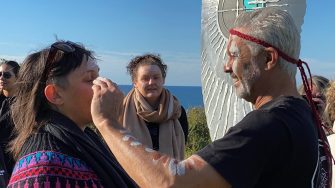
What is the societal challenge?
The significance of culture, wellbeing and holistic development for Indigenous peoples’ education is highlighted in the 2019 Mparntwe Education Declaration, opens in a new window and 2020 Closing the Gap Report, opens in a new window. However, many education authorities continue to judge educational efficacy and base funding decisions on individual student outcomes. Additionally, key priorities identified by the Education Council and Aboriginal groups – such as nurturing emotional, cultural and social wellbeing, and supporting reciprocity and relationships – are often poorly translated into policy. Achieving equity in educational outcomes requires meaningful collaboration between Indigenous communities and education providers, and a sustained commitment to embedding Indigenous knowledges, languages and cultures across education systems.
Project lead
UNSW’s School of Education, faculty of UNSW Arts, Design & Architecture
- Project collaborators
- Find out more
- Associate Professor Kevin Lowe, UNSW Scientia Indigenous Research Fellow , opens in a new window
- Dr Rose Amazan, School of Education, Faculty of Arts, Design & Architecture, opens in a new window
- Scientia Professor Andrew Martin, opens in a new window
- Dr Tracy Durksen, opens in a new window
- The University of Sydney, opens in a new window
- Griffith University, opens in a new window
- Queensland University of Technology, opens in a new window (QUT)
- New South Wales Department of Education, opens in a new window
- Aboriginal Education Consultative Group, opens in a new window (AECG)
- Paul Ramsay Foundation, opens in a new window (PRF)
- National Indigenous Australians Agency, opens in a new window (NIAA)
- Social Ventures Australia, opens in a new window
- UNSW project team: Dr Keiko Bostwick; Dr Sara Weuffen; Julie Welsh; Julie Smith; Mary Kite; Zoë Taylor; Jennifer Eaton;
- Scientia Professor Andrew Martin, opens in a new window
- Associate Professor Kevin Lowe, opens in a new window
Contact us
If you have any questions or suggestions regarding the Societal Impact Framework or the consultation process, please get in touch.
